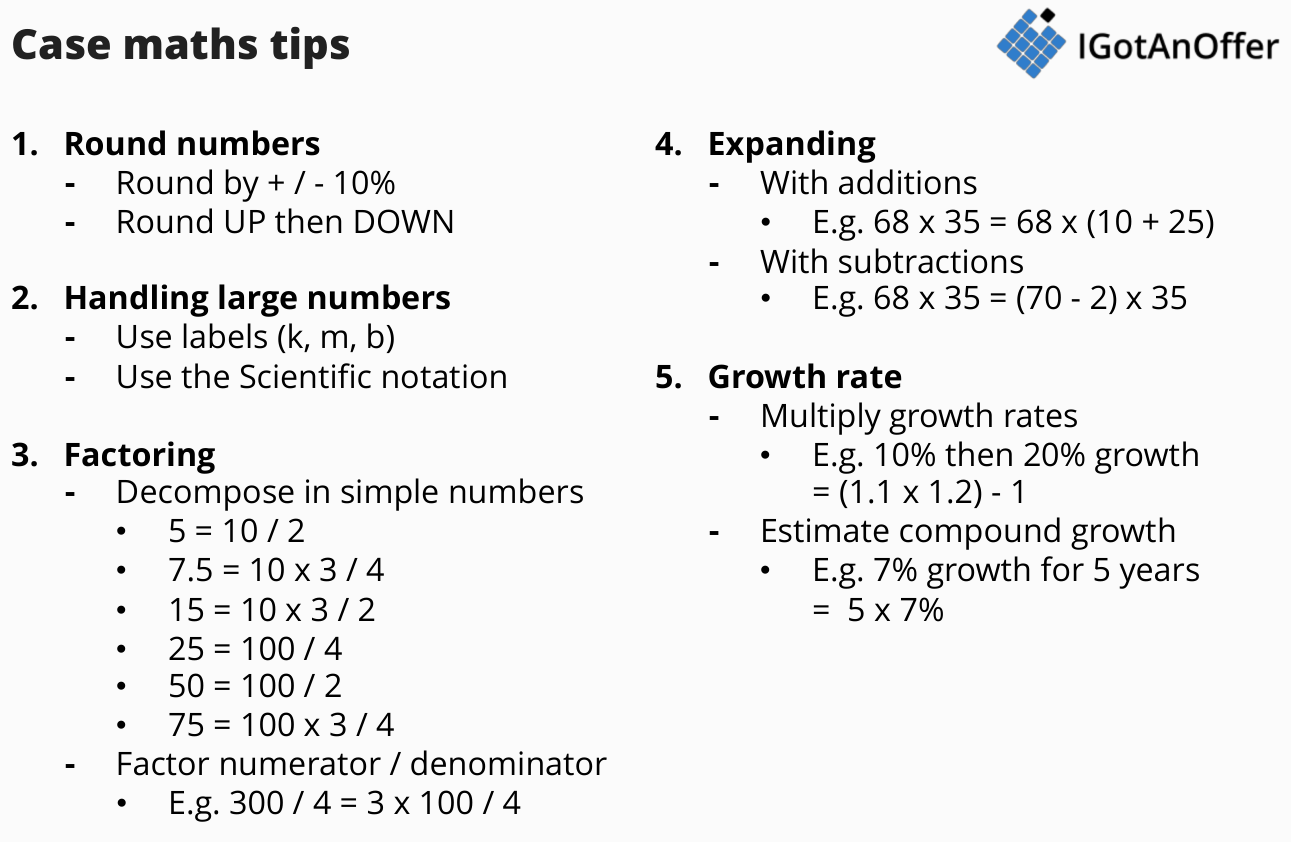Mental Maths Tricks
Maths practise game
I made a little Python script to test myself.
Find it here: Maths game
A comment on notation
I’ve used square brackets to represent place values - in other words, [5][4] = 54 - not multiplication. Note if the there is a value in the brackets which is more than one digit, it (somtimes) adds onto the previous bracket - in other words, [5][11] = [6][1] = 61. Check the examples to see which ones this applies to.
General
-
Go left to right (not right to left, as we’re normally talk).
-
Speak aloud to aid memory.
Addition
1234 + 567
= 1234 + 500 + 60 + 7
= 1734 + 60 + 7
= 1794 + 7
= 1801
Multiplication
Special situations
6 × #x = #x (if x = 2, 4, 6, 8, 0)
11 × AB = A[A+B]B
11 × ABC = A[A+B][B+C]C
etc
AB × AC (when B+C=10) = [A×(A+1)][B×C]
e.g. 14 × 16 = [1 × 2][4 × 6] = [2][24] = 224
Note when B=C=5:
A5 × A5 = [A×(A+1)]25
e.g. 35 × 35
= [3 × 4][5 × 5] = 1225
AB × CD (where CD = E×F) = AB × E × F
e.g. 14 × 16 = 14 × 4 × 4 = 56 × 4 = 224
Criss-cross method (my favourite!)
AB × CD = [A×C][A×D+B×C][B×D]
≡ 100(A×C) + 10(A×D + B×C) + BD
e.g. 12 × 34
= 100(1×3) + 10(1×4 + 2×3) + (2×4)
≡ 300 + 100 + 8
= 408
Duplicate: AA, or AB × AC, or BA × CA (not AB × CA)
e.g. 33 × 78 = 100(3×7) + 10(3 × 7+8) + (3×8) ≡ 2100 + 450 + 24 = 2574
e.g. 37 × 38 = 100(3×3) + 10(3 × 7+8) + (7×8) ≡ 0900 + 450 + 56 = 1406
e.g. 73 × 83 = 100(7×8) + 10(3 × 7+8) + (3×3) ≡ 5600 + 450 + 09 = 6059
ABC × DEF = [A×D][A×E+D×B][A×F+B×E+D×C][B×F+E×C][C×F]
= 10000(A×D) + 1000(A×E + D×B) + 100 (A×F + B×E + D×C) + 10(B×F + E×C) + (C×F)
e.g. 123 × 456
= 10000(1×4) + 1000(1×5 + 4×2) + 100(1×6 + 2×5 + 4×3) + 10(2×6 + 5×3) + (3×6)
= 10000(4) + 1000(13) + 100(28) + 10(27) + (18)
= 40000 + 13000 + 2800 + 270 + 18
= 56088
Bases method (for similar size, or squaring)
When AB=base+E and CD=base+F:
base(AB+F) + E×F
e.g. 12 × 34 with base 10
= 10(12+24) + 2×24
= 360 + 48
= 408
e.g. 12 × 34 with base 20
= 20(12+14) + -8×14
= 520 - 112
= 408
If squaring
e.g. 13², base 10:
13 = 10 + 3
13 + 3 = 16
16 * 10 = 160
3² = 9
160 + 9 = 169
e.g 69², base 60:
69 = 60 + 9
69 + 9 = 78
78 × 60 = 4680
9² = 81
69² = 4680 + 81 = 4761
100 minus method (if close to 100)
AB × CD = [100-((100-AB)+(100-CD))][(100-AB)×(100-CD)]
e.g. 12 × 34
= [100-((100-12)+(100-34))][(100-12)×(100-34)]
= [100-(88+66)][88×66]
= [100-154][88×66]
= [-54][5808]
= 408
e.g. 88 × 66
= [100-((100-88)+(100-66))][(100-88)×(100-66)]
= [100-(12+24)][12×34]
= [54][408]
= 5808
Squaring a three-digit number
ABC² = 10000(A²) + 100(B²) + C² + 1000(2×A×B) + 100(2×A×C) + 10(2×B×C)
≡ 10000(A²) + 100(B²) + C² + 2[1000(A×B) + 100(A×C) + 10(B×C)]
≡ 10000(A²) + 1000(2×A×B) + 100(B²+2×A×C) + 10(2×B×C) + C²
e.g. 317²
= 10000(3²) + 100(1²) + 7² + 1000(2×3×1) + 100(2×3×7) + 10(2×1×7)
= 90000 + 100 + 49 + 6000 + 4200 + 140 = 100489
= 100489
Division
Divide by
3 → Decimal multiple of 0.333
e.g. 77 / 3 = 25.666…
5 → Decimal = final digit of dividend × 2 / 10
e.g. 1234 / 5 = something.8
6 → Decimal multiple of 0.5 × 0.333
e.g. 77 / 6 = 12.833
where 0.833 = 0.333 × 2.5
9 → x / 9 = 0.xxx
e.g. 5 / 9 = 0.555…
7 → Repeating pattern to memorise
1 / 7 = 0.142857142857
2 / 7 = 0.2857142857
3 / 7 = 0.42857142857
11 → Multiples of 0.09… recurring
e.g. 4 / 11 = 0.4545…
Divisible by
2: last digit multiple of 2
4: last two digits divisible by 4 (or 00)
8: last three digits divisible by 8 (or 000)
3: sum of digits divisibly by 3
9: sum of digits divisible by 9
5: final digit 0 or 5
6: divisible by 2 + divisible by 3
12: divisible by 3 + divisible by 4
11: (sum odd position numbers - sum even position numbers) divisible by 11 (or 0)
Square Rooting
| Number | Square |
|---|---|
| 1 | 1 |
| 2 | 4 |
| 3 | 9 |
| 4 | 16 |
| 5 | 25 |
| 6 | 36 |
| 7 | 49 |
| 8 | 64 |
| 9 | 81 |
| 10 | 100 |
If a perfect square
e.g. √1849
Final digit = 9
… so final digit of answer is 3 (3²=9) or 7 (7²=49) [see table above]
Nearest square below 18 = 4 (4²=16) [see table above]
4 × (4+1) = 20
(always n × (n+1))
20 > 18, so 3 not 7
(if < it would have been 7 not 3>)
√1849 = [4][3] = 43
If an imperfect square
e.g. √87
√81 = 9 (closest but under)
9 × 2 = 18 (double)
87 - 81 = 6 (difference)
= 9 + (6/18)
= 9.333
√138
√121 = 11
11 × 2 = 22
138 - 121 =17
= 11 + (17/22)
~=11.75
Other tricks
Halve and Double
160 × 350
= 80×2 × 700/2
= 80 × 700
= 56000
Final digit = 5 (or .5)
36 × 25
= (36/4) × (4×25)
= 9 × 100
= 900
Breaking up
68 × 35
= 68 × (10+25)
= (68×10) + (68×25)
= 680 + (17×4×25)
= 680 + (17×100)
= 2380

